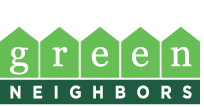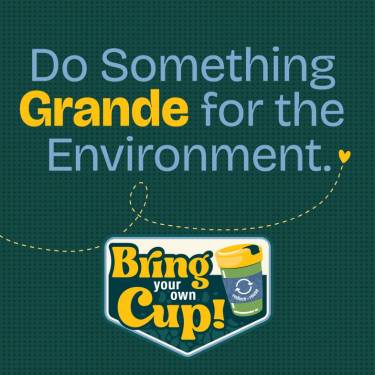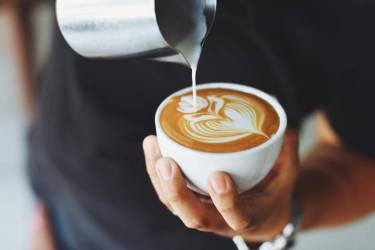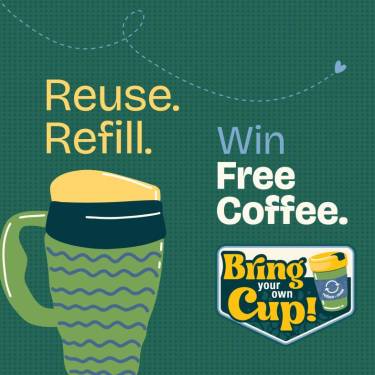Green Blog
Bring Your Own Cup (BYOC) Campaign
Coffee talk
Did you know adults in the US drink 516 million cups of coffee per day? For many, coffee is an everyday habit, yet few stop to consider the environmental footprint of their daily cup.
Starbucks alone pours more than 8,000 disposable cups per minute worldwide, requiring more than 1.6 million trees to be harvested every year just to produce their single-use cups. These single-use, disposable, and to-go cups contain petroleum-based plastics, such as polyethylene, polyprorylene, or polystyrene #6, which act as moisture barriers but make recycling difficult. Because of the plastic content, single-use cups, lids, stirrers, and even the cardboard cupholders cannot be efficiently or inexpensively broken down for recycling.
Coffee sales also have a detrimental environmental impact thanks to the more than 50 billion single-use coffee cups that go into waste landfills every year. Once in the landfill, it takes 1,000 years for plastics to decompose, contaminating the soil, water, and air around them. In Clark County, more than 100 coffee shops provide single-use, non-recyclable cups and accessories that wind up in the Finley Butte Landfill in Boardman, Oregon.
Bring Your Own Cup (BYOC)
It's a sobering picture but it's not all gloom and doom. Countries around the world are slowly moving towards single-use plastics bans as well as developing programs that encourage businesses and consumers to engage in more sustainable practices. In Washington state, the Bring Your Own Cup (BYOC) campaign encourages coffee drinkers to pledge to bring their own reusable cup and provides participants the opportunity to win prizes while reducing waste.
Locally, Clark County has partnered with the Department of Ecology to promote BYOC and the use of reusable and refillable cups with the goal of reducing single-use cups in coffee shops throughout the area.
Refilling consumer-owned reusable cups has benefits for coffee businesses by reducing the purchase and waste management of single-use cups, for the state by creating less litter, and for coffee drinkers who can receive incentives in the form of a gift card.
How to participate
Join the BYOC movement:
- Take the BYOC Pledge to remember your reusable cup. If anyone asks, the Washington State Retail Food Code allows for refilling consumer owned containers.
- Try the Starbucks incentive program. All Starbucks locations in the US and Canada provide a $0.10 discount and 25 stars for bringing a reusable cup.
- Invite a friend, neighbor, or family member to participate too. Encouraging others doubles the impact!
- Set up a routine to make using a reusable cup a no-brainer.
- Make sure there is always a clean cup in the car or backpack.
- Most stores cannot clean reusable cups.
- Know the cup's volume to confirm drink size when an order is placed.
- Hang on to the lid while a drink is being made.
- Rinse out the cup when you get home so it is ready for your next drink.
Remember to always compost the coffee grounds!
Like single-use cups, coffee grounds don't belong in the landfill. Coffee grounds are food waste and can be composted at any of Clark County's We Compost community hub locations.
If you are a gardener or composter, remember to ask your local coffee shop to save coffee grounds for your garden or compost pile!
Here's a quick message from Clark County's own Compost Pete reminding coffee drinkers that coffee grounds make an excellent garden compost. Check out Pete's short YouTube video 'Making Compost from Coffee and Paper.'
By: Linda Frederiksen
Compost Recycler Class of 2025




